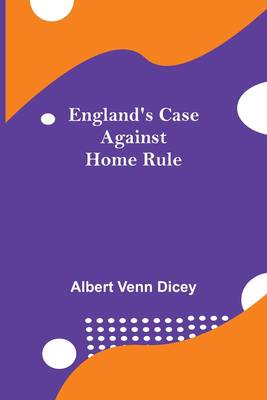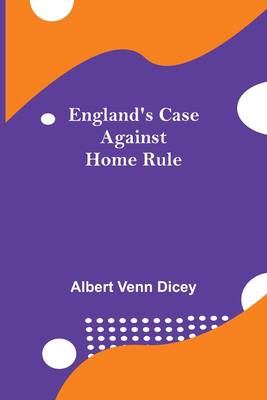
- Afhalen na 1 uur in een winkel met voorraad
- Gratis thuislevering in België vanaf € 30
- Ruim aanbod met 7 miljoen producten
- Afhalen na 1 uur in een winkel met voorraad
- Gratis thuislevering in België vanaf € 30
- Ruim aanbod met 7 miljoen producten
Zoeken
€ 34,95
+ 69 punten
Uitvoering
Omschrijving
A lucid and piercing argument from a master of constitutional history, England's Case Against Home Rule stands as a compass for times of constitutional crossroads and cultural doubt. Albert Venn Dicey's classic political treatise offers a concise, sharply argued historical political analysis of Britain's constitutional order. From the empire and parliament to the delicate balance of powers that underpinned Victorian Britain and the early twentieth century UK, the work places home rule within a broad network of legal and political principles. It is more than a snapshot of debate; it is a carefully reasoned study of how law, tradition and national identity shape public life. For political scholars and for students of history, the book remains a vital reference in british constitutional history and the story of English political thought. Out of print for decades and now republished by Alpha Editions, this edition is restored for today's readers and for future generations. It is not merely a reprint but a collector's item and a cultural treasure, a tangible link to the debates that shaped modern governance. The prose is clear, the reasoning rigorous, and the stakes as relevant as ever for those exploring constitutional law classics, empire and parliament, and the enduring tensions between unity and self-government. Ideal for casual readers and classic-literature collectors alike, this edition invites renewed engagement with a pivotal work in the canon of english political treatises and the enduring arc of uk constitutional history.
Specificaties
Betrokkenen
- Auteur(s):
- Uitgeverij:
Inhoud
- Aantal bladzijden:
- 192
- Taal:
- Engels
Eigenschappen
- Productcode (EAN):
- 9789354754890
- Verschijningsdatum:
- 5/07/2021
- Uitvoering:
- Paperback
- Formaat:
- Trade paperback (VS)
- Afmetingen:
- 152 mm x 229 mm
- Gewicht:
- 290 g

Alleen bij Standaard Boekhandel
+ 69 punten op je klantenkaart van Standaard Boekhandel
Beoordelingen
We publiceren alleen reviews die voldoen aan de voorwaarden voor reviews. Bekijk onze voorwaarden voor reviews.








